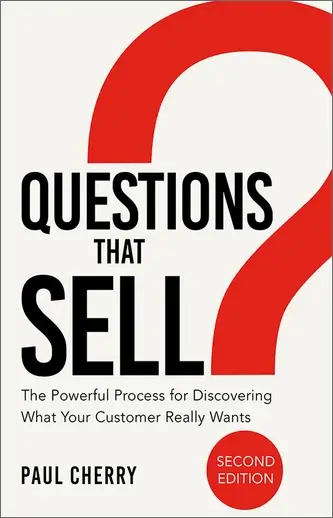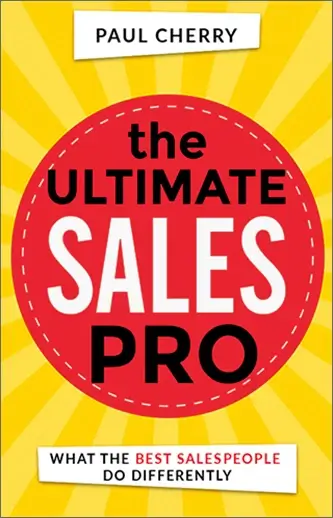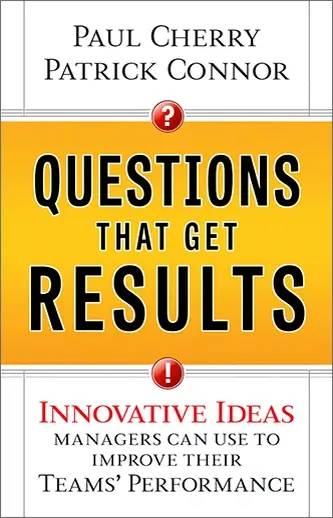This article was first published a few years ago, and it has proven to be one of our most popular posts. I think it carries a much-needed positive message. I’ve made a few updates, and I hope you find the material beneficial. Happy reading!
What’s the secret for achieving sales success? At Performance Based Results, we interviewed 400 highly-experienced business-to-business sales professionals and identified eight qualities you need to look for in coaching a current sales rep or hiring a new candidate, to achieve maximum sales results:
1. Be Persistent in Sales – Without Being Pushy
I call it creative persistence. There’s a fine line between persistence and pushiness, and a smart sales professional knows how to toe that line. When good salespeople meet an obstacle — unreturned phone calls, no response to emails or texts — they don’t give up. But they don’t make pests of themselves, either. Such a person will find ways to reconnect before that opportunity withers away. It’s not just a matter of leaving call after call in his contact’s voicemail. In order to connect, he’ll try new tactics such as engaging the “gatekeeper,” the executive assistant or a fellow sales rep within the organization. He may even show up in person at unconventional times during business hours — like super early, before work starts, or right at closing time — or even send a text on a Saturday morning.
When great salespeople reach a sales obstacle (sales stall, sales roadblock) they approach the situation from a new angle. For example, one salesperson was trying to reach an organization’s vice president of sales for weeks, with no response. So he bought some green notepad paper, took out his Sharpie, and made it to look just like a $100 bill and wrote a note to the VP reading, “Let’s turn this into real money for you and your sales team!” He crumpled it up, threw it into an oversized envelope, and mailed it to him. The client got a laugh, and actually called him back that day. They set up a one-on-one business meeting, got an excellent dialogue going — and in little time, he won the account. For achieving sales success — be creatively persistent.
2. Be Passionate About What You’re Selling
Persistence and passion typically go hand in hand. A good salesperson is passionate — that is, she truly believes in her solution. She’s hungry, motivated and competitive. This sales rep is a doer, not just a talker. She doesn’t blame the current economic climate, or a competitor’s lower pricing, or waste time whining about possible weaknesses in her product compared to the competition. She’s got great ideas, and they’re measurable by the number and quality of her activities. Passionate salespeople, when achieving sales success, create their own opportunities instead of waiting around for them!
3. Build New Business Relationships
The key is for salespeople to actively prospect new business relationships rather than limiting their sales efforts to a dwindling customer base. There’s a fine line to know when to nurture a present client or seek out new business. Leveraging and strengthening an existing customer base is important, to be sure, but it’s all too easy to become complacent and keep calling on the same customers.
Sometimes the relationship has run its course. In today’s ever-changing business climate, a salesperson’s timing might be off. A once-promising customer may now be in dire straits, possibly due to mergers and downsizing. He’s better off investing his time and efforts on fresh new opportunities. Good salespeople are always looking to develop new business relationships, not waiting until their current well runs dry.
4. Do Your Research Before the Call
Great salespeople always bring value on every call. They research, plan and strategize their key accounts. Many sales reps, during a sales call, have a tendency to overwhelm a prospect by reciting sales capabilities that may (or may not) have any relevance to what the customer is looking for. I refer to this technique as “show up and throw up.” News Flash: It doesn’t work.
Up to 50% of the outcome of a major sales call is determined before even one word is exchanged. Good salespeople, when achieving sales success, are thinking about multiple plans. In fact, they’ve already figured out Plans A, B and C before they even walk in the door. They’ve done their homework and are armed with knowledge to offset any possible sales stall.
Performing an Internet search and checking out a prospect’s website is a good start, but great salespeople go further. There are many ways to obtain information about your prospect and the prospect’s company— LinkedIn, Twitter, Facebook, company forums, press releases, financial statements, and even a company’s YouTube channel — all of these sources can provide additional information about industry trends, insider information, news of competitive threats, internal issues — and even your prospect’s personal goals and interests.
5. Develop New Relationships in Established Accounts
When a salesperson wins an account and develops good rapport with a buyer, he tends to gravitate towards that relationship, becoming protective of it. But when he does, he might fall into the trap of being too cautious. He may fear that if he tries to build new relationships, he’ll step on his contact’s toes or offend him some other way.
The sales rep may think, “This person will help open doors for me.” But when his contact says, “Oh, you don’t need to contact anyone here but me,” that’s a red flag signaling that he does not have a good relationship to begin with.
Relationships can turn on a dime. Even if a sales rep thinks he’s got it made with a particular account, if he suddenly loses this business relationship, he’ll find himself starting from scratch. Most contacts in an established relationship will introduce you to others in their organization, as long as you appeal to their WIIFM (What’s In It For Me). Find out what motivates them. Is it looking good, making their job easier, minimizing risks, or helping them be more successful? Address what’s important to them and they will gladly open doors for you.
6. Questions to Discover Your Prospect’s Needs
Most salespeople have the best intentions, but without realizing it, they’re often doing more talking than listening. It’s important to realize that asking and listening go hand-in-hand — a great sales rep needs to show genuine interest and listen. In one of my most popular sales training workshops, Questions That Sell, the most crucial concept I try to get across is that asking the right questions allows you to discover (qualify) if there actually is an opportunity to pursue. Your job is to know:
- How pressing is the prospect’s need?
- Who is involved?
- How are decisions made?
- What’s the unique criteria your prospect looks for in a vendor relationship?
- Is there a sense of urgency?
- What are the underlying motivations?
- What kind of budget do they have to invest with you?
7. Sell Your Customers on Value – not Price
What if a good salesperson takes pride in his premium product or service, only to be told his price is too high? Not necessarily a problem if he’s already asked great questions of all the right people in the organization and done his homework. By then, the sales rep understands his customer’s needs and issues, and where the customer wants to go. Because the sales rep understands, he’s easily able to justify why the customer needs to make that initial investment in the rep’s solution over competitive choices. Sure, the customer can pick other options, but there’s always the implication that if he were to do so, the risk would be too great.
Let’s say the customer went with a lower-priced computer system of lower quality. A glitch in the customer’s computer system causes it to crash, bringing everything in the company to a standstill for the rest of the day. That could cost the customer thousands of dollars, easily wiping out what he saved when he bought that cheap system. Or let’s say a delivery to the customer’s customer was a day late. That’ll not only cost the customer big bucks, it could cost them a client! Bottom line is that customers will spend more money rather than risk their reputations or their jobs.
Good sales reps thrive on selling value because the additional investment in choosing a premium service fully outweighs the potential cost of doing business with a cheaper but inferior alternative. A salesperson in our study shared the following example:
A radiologist was looking to invest in an expensive piece of surgical equipment for patients with spine issues. Treatment with this device costs $2,000 per patient. The doctor decided to go with a more expensive offer. He ended up spending a good $37,000 on the device, about 25% more than what the competition was offering.
Why did he choose to pay more? If he had bought equipment of lesser quality, and that inferior machine went down for even one day, it would mean the difference between the doctor helping 12 patients (his typical per-day average) vs. being able to help zero patients! When you do the math: 12 patients times $2,000 = $24,000! So you see, in the long run, equipment that performs well and is more dependable saves money (and patients).
8. Get Customers to Commit
Sales commitment is an important goal when salespeople are trying to achieve some form of closure, some kind of outcome to each sales call. Even if the salesperson doesn’t get an agreement on an order right away, because multiple steps are required — that’s okay. This salesperson knows she won’t be satisfied with just leaving some literature and promising a follow-up call. She always has a purpose, a call-to-action. It could be as simple as the sales rep scheduling a follow-up meeting with other parties, or an appointment to return to demonstrate a product or service to the customer, or bringing the customer and his boss to visit and evaluate the salesperson’s facility.
For achieving sales success, whatever it takes for the sales rep to encourage customers to continue the sales process is paramount. By getting them to invest their time and resources, they demonstrate a willingness to keep the sale moving forward.






